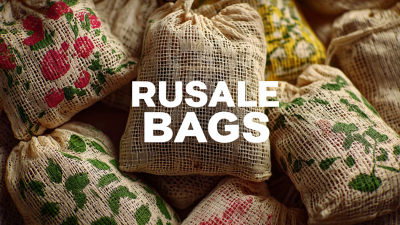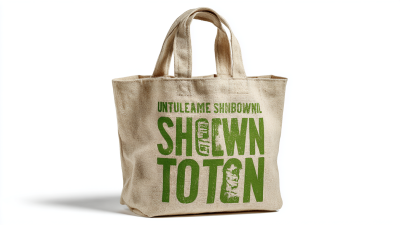The increasing concern over environmental degradation and plastic pollution has led to a significant shift towards more sustainable consumer choices, particularly in the realm of reusable bags. According to a report by Grand View Research, the global market for eco-friendly bags is expected to reach USD 43.4 billion by 2027, underscoring the growing demand for environmentally friendly alternatives. Among these, environmentally friendly tote bags stand out as practical and stylish solutions that not only reduce single-use plastic consumption but also promote sustainability in various ways. This blog aims to provide a comprehensive comparative analysis of different materials used in the production of these tote bags, highlighting their ecological impacts and the sustainability practices adopted by manufacturers. By understanding the nuances of these options, consumers can make informed decisions that align with their values and contribute positively to the environment.

The choice of material in tote bags plays a crucial role in determining their environmental impact. Traditional options such as plastic and non-biodegradable materials significantly contribute to landfill waste and ocean pollution. As consumers become more eco-conscious, many are turning to alternatives like organic cotton, jute, and recycled polyester. While organic cotton is biodegradable and less chemically intensive, it requires considerable water for cultivation. Jute, on the other hand, is a renewable resource and works well in reducing carbon footprints during production.
Moreover, the sustainability practices surrounding the production of tote bags also matter. Brands that prioritize ethical manufacturing processes and engage in fair labor practices create a more positive environmental impact. Assessing the lifecycle of a tote bag—from sourcing materials to end-of-life disposal—provides insights into which options are genuinely sustainable. By understanding these factors, consumers can make informed decisions that align with their values while actively reducing their environmental footprint.
When it comes to eco-friendly tote bags, the choice of material plays a crucial role in determining both sustainability and environmental impact. Organic cotton stands out for its biodegradable properties and minimal use of pesticides during cultivation. As a natural fiber, it is not only strong and durable but also offers a soft feel, making it comfortable for everyday use. Furthermore, organic cotton production supports soil health and reduces water consumption compared to conventional cotton farming.
On the other hand, recycled polyester presents an innovative approach to sustainability. Made from post-consumer plastic bottles, this material helps reduce plastic waste and conserves resources by reusing existing materials. Although it is not biodegradable, its durability and resistance to wear make it a popular choice for reusable bags. Jute, a natural fiber sourced from the jute plant, is another excellent alternative that is fully biodegradable and has a low environmental footprint. Its strength and low cost make it a practical option for environmentally-conscious consumers. By comparing these materials, we can better understand their unique benefits and potential impacts on our planet.
| Material | Sustainability Rating | Biodegradability | Durability (years) | Recyclability | Cost per Bag ($) |
|---|---|---|---|---|---|
| Organic Cotton | High | Yes | 3-5 | Limited | 2.50 |
| Recycled Polyester | Medium | No | 5-7 | Yes | 1.80 |
| Jute | High | Yes | 4-7 | Limited | 1.50 |
Sustainable manufacturing practices play a vital role in reducing the environmental footprint of tote bag production. According to a report by the Ellen MacArthur Foundation, the fashion industry contributes to 10% of global carbon emissions, with single-use plastics dominating the market. Eco-friendly tote bags, often made from organic cotton, recycled materials, or jute, present a sustainable alternative that can markedly diminish these emissions. For instance, using recycled polyester can reduce energy consumption by up to 75% compared to virgin polyester production, showcasing the impact of material choice on sustainability.
Tip: When purchasing tote bags, look for those certified by organizations like the Global Organic Textile Standard (GOTS) or other eco-labels that ensure responsible sourcing and production practices.
Furthermore, implementing renewable energy in manufacturing processes can significantly lower carbon footprints. A study by the Carbon Trust highlighted that factories using solar or wind energy can reduce carbon emissions by up to 50%. Companies that incorporate closed-loop systems, where materials are reused and recycled, further contribute to a circular economy, minimizing waste.
Tip: Support brands that prioritize sustainability by researching their manufacturing practices and certifications, ensuring your choices align with your eco-friendly values.
As consumers become increasingly aware of environmental issues, the choice of tote bags has emerged as a clear reflection of their sustainable lifestyles. Unlike single-use plastic bags, eco-friendly tote bags, made from materials like organic cotton or recycled fibers, offer a durable alternative that not only reduces waste but also signifies a commitment to sustainability. By opting for these reusable bags, consumers actively contribute to decreasing their carbon footprint while supporting brands that prioritize eco-conscious practices.
Moreover, tote bags serve as a powerful tool for advocating sustainable living. When individuals carry their stylish, eco-friendly totes, they are making a statement—a reminder to others about the importance of choosing sustainable products. This shift in consumer behavior not only influences shopping habits but also fosters a culture of environmental responsibility. As more people gravitate towards these sustainable options, the ripple effect can inspire communities to adopt greener practices, further reinforcing the notion that small choices can lead to significant environmental change.
In recent years, eco-friendly tote bags have become essential companions for environmentally conscious shoppers. These bags not only help reduce plastic waste but also feature innovative designs that blend functionality with style. From foldable structures for easy storage to multi-use compartments, manufacturers are embracing creativity to cater to the diverse needs of their users. The incorporation of unique features, such as insulated pockets for keeping food and beverages fresh, showcases how practicality can coexist with eco-friendliness.
Sustainability practices are at the core of modern tote bag production. Many brands are opting for recycled materials like post-consumer plastics or organic cotton, ensuring that their products are both durable and environmentally responsible. Additionally, the use of non-toxic dyes and minimal packaging further enhances their commitment to sustainability. As consumers increasingly prioritize eco-conscious choices, tote bags are evolving beyond simple carrying solutions to become symbols of a greener lifestyle. This transformation not only addresses environmental concerns but also encourages a shift toward more responsible consumption habits.





